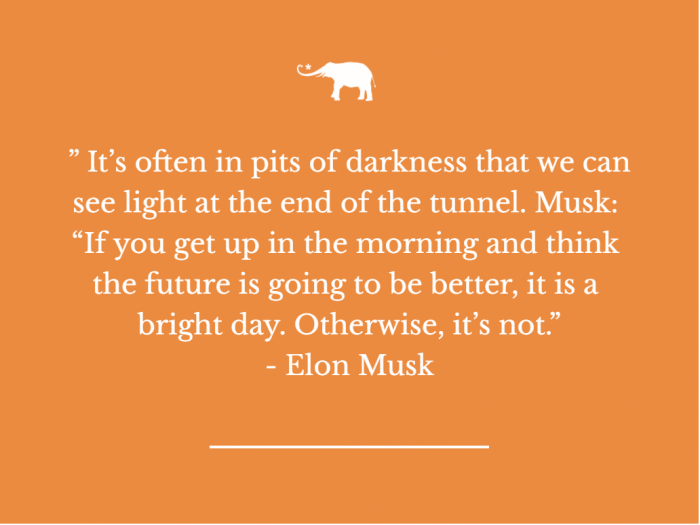While some of these lessons might seem obvious, applying them to our lives on a consistent basis requires constant reminders and a lifetime of practice. Even Elon Musk probably breaks many of these rules himself. If we all adhered to the following 20 best practices on a regular basis, we’d possibly all be 10x more successful than wherever it is we are…
- Listen carefully to the critics to hear what they have to say, but don’t always think that they happen to be right! Musk: “When Henry Ford made cheap, reliable cars, people said, ‘Nah, what’s wrong with a horse?’ That was a huge bet he made, and it worked.”
- Don’t continue doubling down on a solution that isn’t working. The definition of insanity is repeating the same thing over and over again and expecting a different outcome. Musk: “Don’t delude yourself into thinking something’s working when it’s not, or you’re gonna get fixated on a bad solution.”
- Make sure you’re surrounded by people you enjoy being with…of course, if it is within your control. If the workplace becomes toxic, leave it. Or try to work with others on the team to develop a more pleasant work environment Musk: “It’s very important to like the people you work with, otherwise life [and] your job is gonna be quite miserable.”
- Learn from the successes and failures of others. Musk: “You have to say, ‘Well, why did it succeed where others did not?”
- Think about solutions that are 10x better than anything else out there. A slight improvement is not good enough to achieve rapid adoption and behavior change. Musk: “You shouldn’t do things differently just because they’re different. They need to be… better.”
- Think about all the pieces of the puzzle and focus on each of the individual puzzle pieces without neglecting the others. This is an ongoing effort of personal tug of war between various priorities and your time. Never forget that time is your most valuable asset. Musk: “If you’re trying to create a company, it’s like baking a cake. You have to have all the ingredients in the right proportion.”
- Build the right team or join the right team; it’s often much more important to achieving success than the product itself. Musk: “Starting and growing a business is as much about the innovation, drive, and determination of the people behind it as the product they sell.”
- Ignore the resume. Think about a teammate’s character as much, if not more, than their specific technical skills. Musk: “My biggest mistake is probably weighing too much on someone’s talent and not [enough on] someone’s personality. I think it matters [a lot] whether someone has a good heart.”
- Be a good person; whether you think you’re an example or not, you are, particularly in a work environment. Many people watch and observe your behavior, even if you’re not Elon Musk. Be a shining example to your teammates and colleagues by following the simple Golden Rule of doing to others what you would want done to you. Integrity matters. Musk: “We have a strict ‘no-assholes policy’ at SpaceX.”
- Learn how to tolerate pain. A lot of pain. The short and medium-term horizons are often loaded with obstacles and landmines. Beware of them, and attempt to step around or disarm the landmines wherever possible. If your leg is blown off, figuratively speaking, of course, realize that you’re still alive and continue moving forward. Learn, iterate, and do better the next time in avoiding those landmines or disarming them altogether. Musk: “Being an entrepreneur is like eating glass and staring into the abyss of death.”
- Pursue what makes you happy, not only in work, but outside work. Try new hobbies. Join new meetup groups. Try learning a new skill. Start a side-hustle project that you’re passionate about that could someday become a great company. Musk: “People should pursue what they’re passionate about. That will make them happier than pretty much anything else.”
- After carefully planning a course of action and deciding that you’re going to do something, go all-in. Pour 110% of your energy into achieving the carefully thought-out objective. Musk: “What makes innovative thinking happen?… I think it’s really a mindset. You have to decide.”
- If you believe strongly enough in something, pursue it. If things don’t work out initially (as they seldom do), don’t abandon too quickly. See point # 19 below. Musk: “When something is important enough, you do it even if the odds are not in your favor.”
- Try to think positive, even when things are down and remind yourself of the old proverb: “this too shall pass.” It’s often in pits of darkness that we can see light at the end of the tunnel. Musk: “If you get up in the morning and think the future is going to be better, it is a bright day. Otherwise, it’s not.”
- Listen to criticism. Ask for feedback, including negative feedback. Absorb it. Learn from it. Apply criticism that is relevant and discard the balance. Musk: “Really pay attention to negative feedback and solicit it, particularly from friends. … Hardly anyone does that, and it’s incredibly helpful.”
- Get stuff done that will have a lasting impact on your community, environment and the world (ie no chasing quick $). Do it specifically to make a difference in the lives of those around you and the reward will be significant and generous in overall well-being, and might even bring financial success (which is only one small component of overall success in life). Musk: “I don’t create companies for the sake of creating companies, but to get things done.”
- Do not spend your entire life thinking about ways things can fail. Get out there and do it. If it doesn’t work, iterate, and then try again. Iterate again. And again. Most people spend their days optimizing for every possible downside scenario. This obsessive down-size planning ties up mental resources to think creatively and outside of the box to get it done. You should of course analyze the problem or deal at hand and solicit input from others on downside scenarios. Don’t let perfection stand in the way of bringing something good to market. You can always make it better over time. A corollary to this rule for entrepreneurs is to make the product or idea real and tangible as fast as possible. This will help in the feedback loop process discussed in rule #15 earlier and #18 below. Musk: “There’s a tremendous bias against taking risks. Everyone is [always/frequently] trying to optimize their ass-covering.”
- Develop a core group of advisors who will serve as a key part of your constant feedback loop (along with critics – Rule #15 – and initial customers – Rule #17). This core group of trusted advisors could be close friends, family members or even members of your community who know you well enough to offer meaningful advice. Reach out to these advisors often and consistently. Musk: “I think it’s very important to have a feedback loop, where you’re constantly thinking about what you’ve done and how you could be doing it better.”
- Have grit. Do not give up. Most importantly, have patience. It’s one of the hardest lessons of an entrepreneur since entrepreneurs often want results quickly. Musk: “Persistence is very important. You should not give up unless you are forced to give up.”
- Embrace change. Getting cozy and comfortable is easy. Sometimes it’s the right thing to do. But oftentimes, refusing to accept the inevitable change will stunt your own growth and path in life, whether in the personal or professional domain, and prevent you from achieving lasting success. Musk: “Some people don’t like change, but you need to embrace change [especially] if the alternative is [a] disaster.”











Read 0 comments and reply